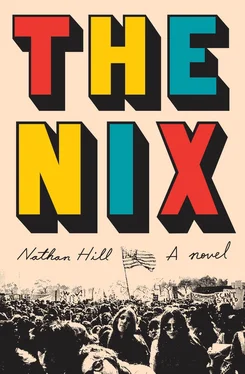He wants to remember what that felt like: a moment of transcendent joy. He had defeated the dragon for the first time. His Chicago friends all cheered.
But now it won’t come to him, the feeling that made him dance so exuberantly. Pwnage tries to imagine himself doing it, but it feels detached — it has the quality of something he saw on television, long ago. The way he feels now, it couldn’t have been him churning the butter, starting the lawn mower, spanking that ass.
Tomorrow, he vows.
Tomorrow will be the first day of the new diet — the real, official first day. And maybe today was actually a warm-up or dry run or head start for the actual first day of the new diet, which would be very soon. One of these days very soon when he would wake up early and eat a healthy breakfast and get working on the kitchen and clean the cabinets and buy some groceries and avoid the computer and finally, for an entire day, do everything exactly, perfectly right.
He swears. He promises. One of these days will be the day that changes everything.
“YOU THINK I cheated ?” says Laura Pottsdam, college sophomore and habitual, perpetual cheater. “You think I plagiarized that paper? Me?”
Samuel nods. He’s trying to look sad about this whole situation, like when a parent has to punish a child. This hurts me more than it hurts you, is the expression he’s trying to produce, even if he does not sincerely feel it. Inside, he secretly likes when he gets to fail a student. It’s like revenge for having to teach them.
“Can I just say? Once and for all? I. Did. Not. Plagiarize. That. Paper, ” Laura Pottsdam says of the paper that was almost entirely plagiarized. Samuel knows this because of the software — the truly exceptional software package subscribed to by the university that analyzes every essay completed by his students and compares them to every other essay in its massive archive of every paper ever analyzed anywhere. The software’s inner brain is made of literally millions of words written by the nation’s high-school and college students, and Samuel sometimes jokes to his colleagues that if the software ever achieved sci-fi artificial intelligence and consciousness, it would immediately go to Cancún for spring break.
The software analyzed Laura’s paper and found it to be ninety-nine percent plagiarized — everything had been stolen except for the name “Laura Pottsdam.”
PLURIUM INTERROGATIONUM (OR, “THE LOADED QUESTION”)
“I wonder what is wrong with the software?” says Laura, second-year university student out of Schaumburg, Illinois, communications and marketing major, five foot two or three, dirty-blond hair that in the greenish gloom of Samuel’s office looks a pale legal-pad yellow, thin white T-shirt featuring what seems to be promotional material for a party that happened almost certainly before she was born. “I wonder why it’s malfunctioning. Is it wrong a lot?”
“You’re saying it’s a mistake?”
“It’s like so weird. I don’t get it. Why would it say that?”
Laura looks like she showered in a wind tunnel, her hair is so frazzled and disorganized. That she is wearing tiny frayed flannel shorts roughly the size of a coffee filter is impossible to ignore. Ditto her deeply bronze leg tan. On her feet, she’s wearing slippers, Muppet-fuzzy, that yellow-green color of cabbage, with a gray-brown film of dirt around the footpads from being worn too often outdoors. It strikes Samuel that she might have come to his office today literally wearing her pajamas.
“The software isn’t wrong,” he says.
“You’re saying never ? It’s never wrong? You’re saying it’s infallible and perfect?”
The walls of Samuel’s office are dutifully decorated with his various diplomas, the shelves filled with books with long titles, the whole dark place affecting a generic professorialness. There’s the leather chair in which Laura currently sits lightly kicking her slippered feet. New Yorker cartoons taped to the door. Little windowsill plant that he waters with a pint-size mister. Three-hole punch. Tabletop calendar. A coffee mug with Shakespeare on it. A set of nice pens. The whole tableau. A coatrack with emergency tweed jacket. He’s sitting in his ergonomic chair. He’s briefly happy about the correct usage of the word “infallible.” The musty odor in his office might be Laura’s sleep smell, or his own smell, still lingering after staying up late playing Elfscape last night.
“According to the software,” he says, looking at the report on Laura’s paper, “this essay came from the website FreeTermPapers.com.”
“See? That’s the thing! Never heard of it.”
He’s one of those young professors who still dresses in such a manner that his students might regard as “hip.” Untucked shirts, blue jeans, a certain brand of fashionable sneaker. This is read by some people as proof of good taste, by others as a sign of internal weakness and insecurity and desperation. He also sometimes curses in class so he doesn’t seem old and square. Laura’s shorts are flannel with plaid bars of red, black, and navy blue. Her shirt is extraordinarily thin and faded, though it is difficult to tell whether this fade is from overuse or whether it was made in the factory to appear this way. She says, “Obviously I’m not gonna copy some stupid paper from the internet. It’s like, no way. ”
“So you’re saying it’s a coincidence.”
“I don’t know why it said that. It’s so, you know, weird?”
Laura occasionally puts that upward phonic at the ends of her sentences so that even her declarations sound like questions. Samuel finds this, like most accents, difficult not to mimic. He also finds her ability to maintain eye contact and keep her body relaxed and unjittery throughout all this lying remarkable. She does not display any of the involuntary physical indications of deception: she breathes in a normal manner; her posture is relaxed and languid; her eyes remain fixed on Samuel’s rather than doing that up-and-to-the-right thing that indicates she’s accessing her more creative brain parts; and her face does not seem to be working unnaturally hard to show emotion, as emotions seem to flutter across her face in a well-timed and more or less natural and organic way rather than the usual liar’s face where it looks like the cheek muscles are attempting to mechanically excrete the proper expression.
“According to the software,” Samuel says, “the paper in question was also submitted three years ago to the Schaumburg Township High School.” He pauses to allow this fact to land and sink in. “Isn’t that your hometown? Isn’t that where you’re from?”
PETITIO PRINCIPII (OR, “THE CIRCULAR ARGUMENT”)
“You know,” says Laura, shifting in her seat, moving one leg under her in what might be the first outward physical sign of distress. Her shorts are so small that when she moves around in the leather chair the skin of her lower buttocks squeaks against it or pulls off with a moist little sucking sound. “I wasn’t going to say anything, but I feel really offended. By all this?”
“You do.”
“Um, yeeee-ahh ? You asking me if I cheated? It’s really, like, rude?”
Laura’s shirt, which Samuel thinks was indeed artificially faded using dyes or chemicals or perhaps UV light or harsh abrasives, says “Laguna Beach Party, Summer 1990” in bubbly vintage-looking letters with a graphic ocean scene in the middle and a rainbow.
“You shouldn’t call somebody a cheater,” she says. “It stigmatizes them. There’s been studies? The more you call someone a cheater, the bigger amount of times they cheat.”
Читать дальше












